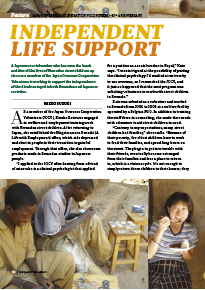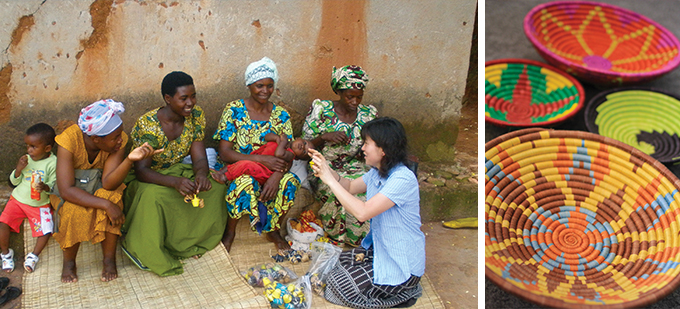Home > Highlighting JAPAN >Highlighting Japan August 2015>Japan Overseas Cooperation Volunteers—50th Anniversary
Highlighting JAPAN

Japan Overseas Cooperation Volunteers—50th Anniversary
Independent Life Support
A Japanese social worker who has seen the harsh realities of the lives of Rwandan street children up close as a member of the Japan Overseas Cooperation Volunteers is working to support the independence of the disadvantaged in both Rwandan and Japanese societies.

As a member of the Japan Overseas Cooperation Volunteers (JOCV), Etsuko Kato was engaged in welfare and employment training work with Rwandan street children. After returning to Japan, she established the Shigoto no aru Kurashi (A Life with Employment) office, which aids depressed and shut-in people in their transition to gainful employment. Through that office, she also showcases products made in Rwandan studios to Japanese people.
“I applied to the JOCV after hearing from a friend of mine who is a clinical psychologist that applied for a position as a social worker in Nepal,” Kato says. “I was intrigued at the possibility of putting the clinical psychology I’d studied at university to use overseas, so I researched the JOCV, and it just so happened that the next program was soliciting volunteers to work with street children in Rwanda.”
Kato was selected as a volunteer and worked in Rwanda from 2006 to 2008 at a welfare facility operated by a Belgian NGO. In addition to training the staff there in counseling, she made the rounds with educators to aid street children in need.
“Contrary to my expectations, many street children had families,” she recalls. “Because of their poverty, the eldest children have to work to feed their families, and spend long hours on the street. They begin to get into trouble with their friends, eventually become estranged from their families and lose a place to return to, which is a vicious cycle. It’s not enough to simply return these children to their homes; they need emotional support and counseling, and an environment in which they can earn stable wages and create a stable economic base for their families. I was made painfully aware of this reality.”
Kato received funding from the Tiny Heart Project (part of the Supporting Organization of JOCV) to launch a studio in October 2007. Young people who have completed occupational training in such fields as creating accessories from cow horn can use their skills to earn wages while producing handicrafts at the studio. The pieces are sold at local souvenir shops, hotels, and at charity events organized by embassies, with the youths earning the equivalent of seventy U.S. dollars a month. Compared to the local teachers’ salary of about fifty dollars a month, this is a considerable wage.
After returning to Japan, Kato continued her counseling work while exploring ways to support poverty relief efforts in Rwanda. She established the Shigoto no aru Kurashi office in 2011 in Aichi Prefecture. Products made by a team of about eight people aged between eighteen and twenty-five at the studio in Rwanda reach Japan, where Shigoto no aru Kurashi members put the finishing touches on them and then sell them at domestic events. Profits go back to the studio in Rwanda and serve as capital for its continued operation.
Funding from the JICA Fund for the People of the World, a charitable donation system established by the Japan International Cooperation Agency that allows direct donations to people in developing countries who suffer from poverty and hunger, enabled Kato to purchase equipment for her studio and build a network in Rwanda. “I am very grateful for that program,” she says. “As a former JOCV member, I’m proud that Japan has a fund like that.”
She adds: “A former JOCV colleague is also working with a women’s group that produces tote bags, sisal hemp baskets, and other accessories. I’d like to keep building new sales routes in Japan for these kinds of products.”
Kato notes that she would like to create three to four such studios in Rwanda, each employing around ten people, and support their growth so that Rwandans can operate them independently. She overflows with warm enthusiasm at the prospect of helping the disadvantaged—both in Rwanda and in Japan—find a footing. .
© 2009 Cabinet Office, Government of Japan






